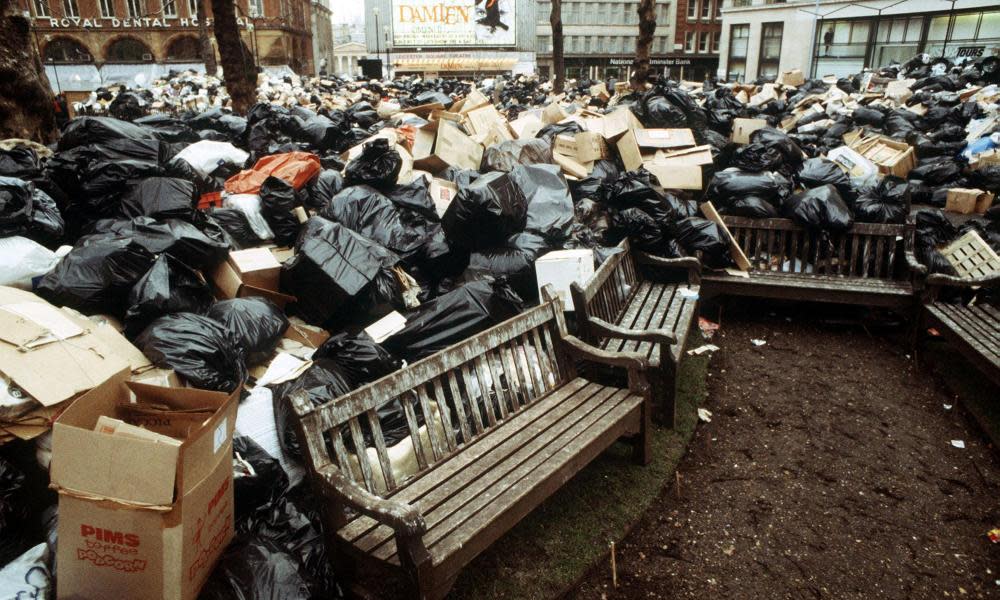Austerity is a living hell. How can anyone describe it as character-building?

“Winter of discontent” is the new “blitz spirit” – the phrase on everyone’s lips, but always loudest from the people who couldn’t conceivably remember it. I don’t remember it myself, but at least I was alive in the late 70s, unlike the rightwing commentator who pulled the starting gun on the week with the explosive claim in the Times that, far from minding being poorer and not warm enough, a large part of the population would actively enjoy it. Middle England loves austerity, remember?
This is part of a building narrative to get ahead of the otherwise unavoidable conclusion that, when you put your country in the grip of maniacs and chancers, actual human suffering ensues. It’s a symphony in three movements: first, shortages, what shortages? Second, anything you’re short of, you’re the problem for being so materialistic. Third, decent people actively enjoy going without, because it’s character-building.
There’s a fundamental question here about the elites and their butler class of commentators: they’ve entered a new phase of moral delinquency where they can openly acknowledge the suffering of others and then explain why it’s good, actually. What on earth happened to them? Have they all got lead poisoning? But a couple of housekeeping points, before we resolve that (spoiler: I am probably not going to resolve it).
While, being five at the time, I have no great recall for the winter of discontent, I can happily still use the internet, and can therefore say with a fair amount of certainty that what we are facing this winter is nothing like 1978. The causes are different, the underlying conditions are different, the character of the government is different, the social response will be different. Just about the only way in which the situations resemble one another is that they are both a winter.
And the critical difference is, of course, that while the nation may have been bitterly divided in the late 70s, between left and right, between supporting unions and wanting to smash them, the impact was at least felt by everyone. You couldn’t rich your way out of a refuse collection strike, or insulate yourself against a power cut, though sure, the wealthy probably had more social capital, a better quality of thermal underwear and fancier candles. In 2021, by contrast, 6 million people are going into energy price spikes and food inflation, having just suffered the largest cut to their benefits since the foundation of the welfare state. In the interests of sanity and reason, let’s say it is a certainty that people already on the breadline will not get any thrill out of more hardship.
Let’s also admit, while we’re here, that nobody enjoys hassle, expense, queueing, going without, putting more effort in to end up with less. Nobody thinks: “Great, my gas bill is now so large that I can feel the sinews stiffening in my formerly puny character.” What people are really talking about, when they extol the joys and exhilarations of belt-tightening, is that spot at the intersection between schadenfreude, superiority and sadism – the place where you warm up your heart thinking of others who have it worse, fluff your ego thinking of all the giftedness and hard work that brought you to this happy place of survival, and add zing to your dreary reality by preaching self-denial to people who already have nothing. This is, in other words, human nature at rock bottom. You’ve built a character, all right; it’s just, unfortunately, a really horrible one.
I’m not against nostalgia per se. I feel plangently homesick for a time when certain things were unsayable, when the barrier to entry into polite conversation was to agree that we all had a duty to one another, a duty to make sure there was no one going hungry two streets away, or 500 streets away, and that duty was rooted in certain human fundamentals, such as: “Other people’s lives are valuable and important.” But the nostalgia of the austerity fetish is cruelty dressed up as cuteness.
Zoe Williams is a Guardian columnist

 Yahoo News
Yahoo News 
